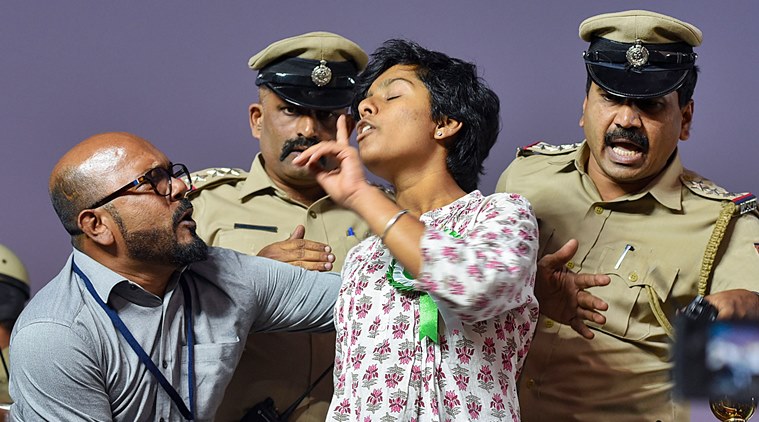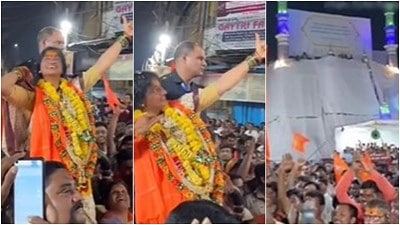- India
- International
Amulya Leona to Azamgarh, sedition law used without questions, Supreme Court guidelines ignored
In its judgments, the Supreme Court has underlined that while ordering arrest of the accused, a magistrate must satisfy herself that the arrest is justified, and that prima facie the FIR has the ingredients that make the offence of sedition.
 Amulya Leona was arrested a day later and sent to judicial custody for 14 days.
Amulya Leona was arrested a day later and sent to judicial custody for 14 days.
Ten minutes past midnight on Thursday, police approached Shirin Javeed Ansari, Vth Additional Chief Metropolitan Magistrate of Bengaluru City, seeking the custody of 19-year-old Amulya Leona whom they had arrested under Section 124A of the Indian Penal Code — sedition — for raising slogans of “Pakistan Zindabad” at a rally to protest the new citizenship law only hours earlier.
In the presence of the teenager’s two lawyers, Judge Ansari asked Amulya when she had been arrested and whether the police had beaten her, before sending the teenager to judicial custody for two weeks. The remand order and FIR are yet to be uploaded online, and Amulya’s lawyers are yet to be given copies of these documents.
The facts of Amulya’s case are similar to the ones in Balwant Singh vs State of Punjab (1995), in which the Supreme Court gave the landmark ruling that mere sloganeering does not amount to sedition.
Explained | Sedition case for ‘pro-Pakistan’ slogans: What did SC rule on archaic law?
“…We find it difficult to hold that upon the raising of such casual slogans, a couple of times without any other act whatsoever the charge of sedition can be founded,” the court said. The two accused in that case, Balwant Singh and Bhupinder Singh, had been accused of shouting “Khalistan Zindabad” and “Hinduan nun Punjab chon kadh ke chhadange, hun mauka aya hai raj kayam karan da (We will drive Hindus out of Punjab. The time has come to establish our rule)”.
Tavleen Singh writes: Dissent is not sedition
The court said: “The casual raising of the Slogans, once or twice by two individuals alone cannot be said to be aimed at exciting or attempt to excite hatred or disaffection towards the Government as established by law in India, Section 124A IPC, would in the facts and circumstances of the case have no application whatsoever and would not be attracted to the facts and circumstances of the case.”

Section 124A criminalises exciting “disaffection” against the government established by law, or bringing it into “hatred or contempt”, and is punishable by life imprisonment. Although the Supreme Court upheld the law in Kedar Nath Singh vs State of Bihar (1962), the court read the provision restrictively — saying only seditious “speech tended to incite public disorder” was punishable.
Editorial | Scared of speech
In its judgments, the Supreme Court has underlined that while ordering arrest of the accused, a magistrate must satisfy herself that the arrest is justified, and that prima facie the FIR has the ingredients that make the offence of sedition — clear and immediate incitement to violence. Also, the magistrate’s order must speak for itself.
However, in the 25-odd arrests made on the charge of sedition in Uttar Pradesh (Azamgarh, 19 arrests), Karnataka (Bidar and Bengaluru, 2 arrests), and Assam (Guwahati, 4 arrests) since the protests against the Citizenship (Amendment) Act began, the remand orders by magistrates have not asked these questions.
“The magistrate cannot treat a personal liberty issue in a routine or mechanical manner, and must be fully satisfied that a remand order is necessary. The gravity of the offence is not the only factor to be taken into consideration for declining bail or granting remand,” former Supreme Court judge Madan B Lokur told The Sunday Express.
Read | Behind Govt’s claim of Naxal link: Amulya’s father stood surety for 2 who joined mainstream in 2014
On February 5, Uttar Pradesh Police filed an FIR in Azamgarh’s Bilariyaganj police station against 36 individuals under 19 sections of the IPC, including 124A (sedition), 147 (rioting), 153-A (promoting enmity between different groups), 504 (insult with intent to provoke breach of the peace), 307 (attempt to murder), and 120-B (criminal conspiracy).
According to the FIR, the 36 persons named “raised slogans against Prime Minister Narendra Modi and Chief Minister of Uttar Pradesh Yogi Adityanath”, and also abused Hindus with “maa behen ki gaaliyan”.
Nineteen people, all Muslims, were arrested, including a 65-year old man. The prosecution sought custody, and submitted a one-page note before Chief Judicial Magistrate (CJM) Pramod Kumar saying that in cases of sedition, the CJM is not competent to grant bail.
In a hearing that lasted barely five minutes, CJM Kumar gave the police custody of all the accused for 14 days. The order is yet to be uploaded on the court website, or given to the accused. The custody period is over, but there has been no change in the situation of the accused because the court has been paralysed by a hartal.
Under Section 439 of the Code of Criminal Procedure, the district court and High Court have concurrent jurisdiction to grant bail in cases where the offence is non-bailable and punishable by life imprisonment or death. However, the CJM has to be satisfied that the arrest is necessary.
“The magistrate must consider whether the offender is likely to abscond or will be available for trial, past antecedents and if a prima facie case is made out,” Justice Lokur said.
In a rare instance, the Chief Judicial Magistrate, Imphal, Ningthoujam Lanleima, passed a detailed order in February 2019 to release the Manipur student activist Veemon Thokchom, who was arrested for an allegedly seditious Facebook post. “I don’t find any attempt or incitement to commit violence,” the judge said in his order releasing Thokchom.
In Assam, special National Investigation Agency judge Mahmud Ahmed is hearing a sedition case against activist Akhil Gogoi, who was arrested on December 12 in Johrat. The Assam Police registered an FIR the following day, and Gogoi was subsequently brought to Guwahati.
“Heard both sides,” judge Ahmed noted in his order granting the NIA 10-day custody of Gogoi.
“The remand orders do not state any reasons because there is barely any application of mind. It is a magistrate’s job to ensure that people are not mindlessly put behind bars but that is what is happening,” Mumbai-based senior advocate and human rights lawyer Mihir Desai said.
The time stamp on the Assam Police FIR is of 11.15 pm on December 13, and the Union Home Ministry transferred the case to the NIA just hours later. When the NIA sought Gogoi’s custody for 20 days, his lawyer Shantanu Borthakur argued that the state police had had virtually no time to investigate the case. However, this argument found no mention in judge Ahmed’s order.
“Gone through the case record and case diary produced by the CIO of this case and considering the gravity of the case, prayer for showing arrest of the accused is hereby allowed and also having taken into account all such aspects of the matter, the court is inclined to grant custody of 10-days for the interest of the investigation,” the order said.
Like the FIR, the one-page order passed on February 17 too, contained no specifics.
Apart from Section 124A, Gogoi and three others, Dhirjya Konwar, Manas Konwar, and Bittu Sonowal, have been charged under provisions of the stringent Unlawful Activities (Prevention) Act (UAPA) for having “links with the CPI (Maoist)” and having “knowingly abetted, conspired, advocated, incited the acts preparatory to the commission of terrorist acts”.
The three-page FIR, however, does not mention any specific inflammatory speech or act by Gogoi.
In Bidar, like in Azamgarh, the police sought custody of two women — Fareeda Begum, headmistress of Shaheen Urdu Primary School, and Najamunnisa, the mother of the child who had allegedly made the purportedly seditious remark — for derogatory statements against the Prime Minister.
The two women did not seek bail before the CJM, anticipating refusal and a longer process. Custody was granted without any questions by the CJM, and the two women applied for bail before the district judge of Bidar.
“Instead of making the bail application before the CJM only to have it rejected, we proceeded to file before the district judge who also has the jurisdiction,” civil rights lawyer B T Venkatesh, who appeared for the accused, said.
Apr 18: Latest News
- 01
- 02
- 03
- 04
- 05






































